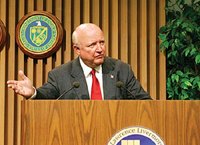HybriBioFuelCellNation
In the past weeks, crude oil prices have defied gravity, Venezuela has threatened to nationalize its oil industry and gas prices have vaulted over three bucks per gallon. Meanwhile, the outgoing chairman of ExxonMobil is reportedly ready to collect some $400 million in retirement benefits and the President of the United States is busy weighing military curtailment of Iran's nuclear aspirations vs. the threat of mines littering the oil-tanker conduit known as the Strait of Hormuz. How much more bad news will it take before we remove our heads from sphincter entrapment? U.S. Secretary of Energy Samuel W. Bodman's recent comments at the Society of Automotive Engineers (SAE) World Congress in Detroit offer a clue.
"One of the reasons we have such high energy prices is there are no alternatives," Mr. Boardman pronounced. So America's Energy Czar has decreed that alternative energy is no longer the PC term for snatching government grant money. All those dismissive conclusions bedeviling solar, biofuel, hydro, and wind energy for the past thirty years or more—they're not "cost effective solutions"– are now moot at the highest levels. It's joyous news for long-time supporters of US energy independence, but how will this translate into government policy?
As Ted Kennedy's sabotage of Nantucket's Cape Wind project proves, it's still energy politics as usual down in Washington. And while "green" energy generation is all well and good, our immediate needs would be better served with another "alternative": more aggressive oil and natural gas extraction right here in the USA. And if nuclear power's good enough for Iran… Rightly or wrongly, environmentalism is not helping America's alleged quest for energy independence. Unless politicians jettison our country's "Not In My Backyard" mindset and throw some legislative weight behind any and all non-import energy sources, Bodman's words are nothing more than the same old lip service.
Secretary Bodman also likes ethanol, the grain-based fuel used to supplement oil-based petroleum spirits. Bodman described US-sourced, domestic ethanol E85 as "what I find exciting" and concluded that "we need to have more [E85 compatible] flex-fuel vehicles on the market of all types and classes." No surprise there. For a reported two or three hundred bucks per vehicle for flex fuel technology, Bodman's dream gets real. But as we've discussed here before, E85's corrosive nature make distribution a monumental challenge. While the government should increase its tax and regulatory assistance to the ethanol industry, there's only one way to make bio-fuels work on a sufficiently epic scale to affect the amount of oil imports: a brand new ethanol-friendly national pipeline network. Of this no mention was made.
Bodman is now into the new low-emission 50-state-legal diesels. Perhaps that will result in an influx of the highly praised Eurodiesels (some made over there by our "Big Three") to power a portion of our fleets. And yes, the Secretary of Energy is also hip to hybrids and plug-in hybrids. More specifically, Bodman announced that the Department of Energy's Advanced Energy Initiative is seeking $6.7m to aid in the further development of plug-in Hybrid Electric Vehicles (PHEV's). Well, that's great, but that figure stands in pathetic contrast to the Exxon exec's retirement fund. Let's face it: the federal government loses more than $6.7m in spilled coffee every day. If America is going to end its so-called oil addiction, we're not going to do it by trying to pay for our rehab with pocket change.
Bodman concluded by stating that the DOE's ultimate goal is putting virtually emission-free, hydrogen fuel-cell powered vehicles on the road by 2020, with mass-market acceptance by 2040. That's great, but how are we going to get there? Is the government going to let hydrogen (i.e. petroleum) manufacturers 'sequester' carbon by-products underground? Are our elected officials moving to implement a nationwide initiative to create, license, regulate and prevent Kennedy-esque sabotage for hundreds of thousands of hydrogen micro-refineries using wind, thermal, tidal, biomass, coal and oil to power the conversion process?
Petroleum has been a great date as far as energy romances go. Bodman says it's over. Words are cheap. The US government needs to start making the bold, large and yes, expensive decisions that will draw a line under our oil infatuation. Or…we can all just wait until the inevitable interruption of our oil supply rips the status quo to bits. Meanwhile, for the last four days I have driven by my local Indiana Chevy dealer and seen GM's new Tahoe SUV's with large 'FLEX FUEL' banners on them. In light of the fact there is no available E85 in our area, the promotion seems like trying to sell amphibious vehicles in the desert. If you want a metaphor for the PC-driven impotence of America's current energy policy, well, there it is.
More by C Douglas Weir
Latest Car Reviews
Read moreLatest Product Reviews
Read moreRecent Comments
- Theflyersfan I used to love the 7-series. One of those aspirational luxury cars. And then I parked right next to one of the new ones just over the weekend. And that love went away. Honestly, if this is what the Chinese market thinks is luxury, let them have it. Because, and I'll be reserved here, this is one butt-ugly, mutha f'n, unholy trainwreck of a design. There has to be an excellent car under all of the grotesque and overdone bodywork. What were they thinking? Luxury is a feeling. It's the soft leather seats. It's the solid door thunk. It's groundbreaking engineering (that hopefully holds up.) It's a presence that oozes "I have arrived," not screaming "LOOK AT ME EVERYONE!!!" The latter is the yahoo who just won $1,000,000 off of a scratch-off and blows it on extra chrome and a dozen light bars on a new F150. It isn't six feet of screens, a dozen suspension settings that don't feel right, and no steering feel. It also isn't a design that is going to be so dated looking in five years that no one is going to want to touch it. Didn't BMW learn anything from the Bangle-butt backlash of 2002?
- Theflyersfan Honda, Toyota, Nissan, Hyundai, and Kia still don't seem to have a problem moving sedans off of the lot. I also see more than a few new 3-series, C-classes and A4s as well showing the Germans can sell the expensive ones. Sales might be down compared to 10-15 years ago, but hundreds of thousands of sales in the US alone isn't anything to sneeze at. What we've had is the thinning of the herd. The crap sedans have exited stage left. And GM has let the Malibu sit and rot on the vine for so long that this was bound to happen. And it bears repeating - auto trends go in cycles. Many times the cars purchased by the next generation aren't the ones their parents and grandparents bought. Who's to say that in 10 years, CUVs are going to be seen at that generation's minivans and no one wants to touch them? The Japanese and Koreans will welcome those buyers back to their full lineups while GM, Ford, and whatever remains of what was Chrysler/Dodge will be back in front of Congress pleading poverty.
- Corey Lewis It's not competitive against others in the class, as my review discussed. https://www.thetruthaboutcars.com/cars/chevrolet/rental-review-the-2023-chevrolet-malibu-last-domestic-midsize-standing-44502760
- Turbo Is Black Magic My wife had one of these back in 06, did a ton of work to it… supercharger, full exhaust, full suspension.. it was a blast to drive even though it was still hilariously slow. Great for drive in nights, open the hatch fold the seats flat and just relax.Also this thing is a great example of how far we have come in crash safety even since just 2005… go look at these old crash tests now and I cringe at what a modern electric tank would do to this thing.
- MaintenanceCosts Whenever the topic of the xB comes up…Me: "The style is fun. The combination of the box shape and the aggressive detailing is very JDM."Wife: "Those are ghetto."Me: "They're smaller than a Corolla outside and have the space of a RAV4 inside."Wife: "Those are ghetto."Me: "They're kind of fun to drive with a stick."Wife: "Those are ghetto."It's one of a few cars (including its fellow box, the Ford Flex) on which we will just never see eye to eye.


































Comments
Join the conversation